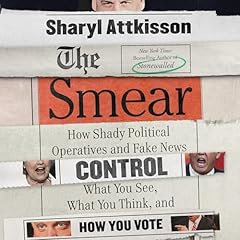
Damage Control
No se pudo agregar al carrito
Add to Cart failed.
Error al Agregar a Lista de Deseos.
Error al eliminar de la lista de deseos.
Error al añadir a tu biblioteca
Error al seguir el podcast
Error al dejar de seguir el podcast
 Exclusivo para miembros Prime: ¿Nuevo en Audible? Obtén 2 audiolibros gratis con tu prueba.
Exclusivo para miembros Prime: ¿Nuevo en Audible? Obtén 2 audiolibros gratis con tu prueba.Compra ahora por $16.87
-
Narrado por:
-
Sean Pratt
Much of the conventional wisdom about damage control and crisis PR is self-serving, self-congratulatory, self-deceiving, and flat out wrong. And no one knows it better than Eric Dezenhall and John Weber, who have helped countless companies, politicians, and celebrities get out of various kinds of trouble.
If you're facing a lawsuit, a sex scandal, a defective product, or allegations of insider trading, other PR experts will tell you to stay positive, get your message out, and everything will be just fine. But happy talk doesn't help much during a real crisis, and it's easy to lose sight of your real priorities. In a trial, for instance, you might want the whole world to think you're a wonderful person, but all that matters is whether 12 jurors think you're guilty.
Dezenhall and Weber are especially dismayed by flacks who compare every problem to the famous Tylenol/cyanide episode of 1982: supposedly proof that making nice, admitting fault, and taking immediate corrective action is all you need to do. In reality, Tylenol's situation was nothing like the typical corporate crisis.
The authors share many powerful lessons, including:
- The difference between a nuisance, a problem, and a crisis
- When you can't get them to like you, get them not to attack you
- It's not about facts; it's about symbols
- The best case studies are the ones you'll never hear about
- Good deeds won't position you out of the line of fire
Los oyentes también disfrutaron:




















Reseñas de la Crítica
Easy to follow
Se ha producido un error. Vuelve a intentarlo dentro de unos minutos.
What made the experience of listening to Damage Control the most enjoyable?
It was enjoyable to learn more about the major corporate crises and what could have potentially helped them to avoid these pitfalls.Was this a book you wanted to listen to all in one sitting?
Yes, we listened to this during a road trip. My husband was intrigued as well.Very Interesting
Se ha producido un error. Vuelve a intentarlo dentro de unos minutos.
The book presents a number of "common sense" crisis responses that make sense when linked to a particular anecdote, but seemingly contradict strategies presented elsewhere in the book. There is little context to show when a particular strategy is appropriate.
While the authors say that they eschew crisis communications "alchemists," this book, when taken as a whole, seems to depict this branch of communications as nothing more than alchemy itself. While ostensively trying to help readers avoid crisis communications mistakes, the subtext is that crisis communications is too difficult to understand and should be left to experts... experts like the authors.
I resent blowing an audible credit and several hours of my time to what has turned out to be a slick, but academically vacant, infomercial. Unless you're looking for "thunk factor" - the sound this book will make hitting the desk of your CEO - in order to justify your hiring of the authors' communications firm, this book is a "pass."
Infomercial For Authors' Crisis-comm Firm
Se ha producido un error. Vuelve a intentarlo dentro de unos minutos.


